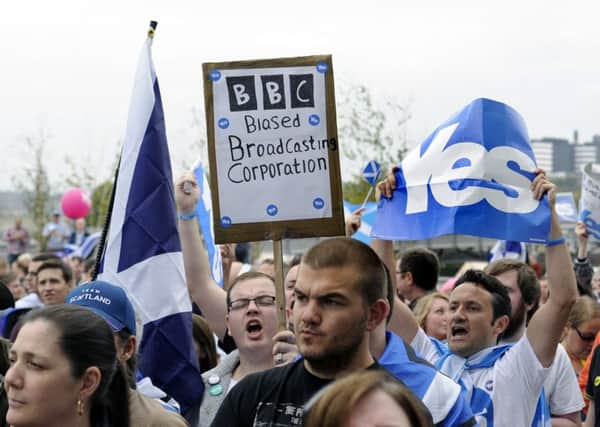Euan McColm: Failing to back journalists puts free speech in danger


Politicians of all parties are frequently to be heard proclaiming their love of – and enduring support for – a free press. A free press is a vital part of a healthy democracy, they say. Journalists must have the right to comment and investigate without fear or favour.
But the reality is that many politicians see a sceptical media as something to be endured rather than encouraged. In some cases, one only has to scratch the thinnest of skins to expose contempt for the reality of a press unencumbered by state control.
Advertisement
Hide AdFormer first minister Alex Salmond was especially vitriolic about journalism that did not meet up to the standards he expected (by which I mean journalism that did not meekly accept his every word as unquestionable gospel). Perhaps you remember when, shortly before the independence referendum, thousands of Yes campaigners gathered outside the BBC’s Scottish headquarters to demand the sacking of the corporation’s then political editor Nick Robinson. Staff were intimidated by an angry mob. But to Salmond, this was a civic and joyous display of democracy.
The SNP, in my experience, has form for this sort of thing. Just about every political editor I know has stories about Salmond calling their bosses to try to kill perfectly legitimate stories. Chums who work at the BBC tell me of relentless complaints, mostly baseless, which make it too troublesome to report even the slightest criticism of the party.
The upshot of the SNP’s campaign to muzzle irritants in the media is that a substantial section of the party’s support believes the party’s narrative that the press is out to get them. Just like supporters of Labour leader Jeremy Corbyn or Republican presidential candidate Donald Trump, they believe their cause is unfairly attacked by journalists with agendas.
Which brings me to the case of Stephen Daisley, the digital politics and comment editor of STV who, after complaints from SNP politicians, has been gagged by his employers.
Daisley – a fine prose stylist – is employed to run the TV station’s online political coverage, a role which includes the commissioning of columns by a variety of commentators. Until 19 July, he also wrote for the STV website, himself.
Daisley was frequently sceptical about the SNP and made a name for himself as something of a provocateur. This was a good thing. Without contrary, thought-provoking, even infuriating opinions, our national discourse is the poorer.
Advertisement
Hide AdAnyway, those wishing to be infuriated by Daisley’s views may not now read them.
During a springtime event at Westminster, hosted by STV, SNP politicians complained about Daisley’s writing. The party’s culture spokesman John Nicolson (who, in a previous life, was a BBC journalist) and the former Runrig keyboard player turned MP Pete Wishart also raised concerns about Daisley’s use of social media.
Advertisement
Hide AdI have been fortunate, during what passes for a journalistic career, to have worked for editors who, when confronted by a whining politician who wished to nobble something I’d written, would invariably invite that politician to bugger off.
Daisley’s employers seem made of weaker stuff and he has been stopped from writing comment pieces. Two MPs have succeeded in silencing a contrary voice.
Depressingly, if unsurprisingly, many of those who support the SNP see this as a victory. Because Daisley wrote things with which they disagreed, it is perfectly reasonable for him to be censored.
This is a reckless attitude. Support for a healthy free press is a principle that can’t be caveated. One is either in favour of it or not. And that means tholing views with which one disagrees.
STV has previously been criticised for being rather too cosy with the Scottish Government. One thinks of the STV Hogmanay show, which saw actress Elaine C Smith joined not only by First Minister Nicola Sturgeon but her mother, Joan, and her sister, Gillian. It was less light entertainment than SNP love-in, a misjudgment that damaged the channel’s credibility.
Not so long ago, director of content Alan Clements – husband of Kirsty Wark – was accused of being too pally with Labour after it emerged he had holidayed with former first minister Jack McConnell. Now, there is an impression that, under his leadership, STV is too pally with the SNP.
Advertisement
Hide AdNicolson, a rather brittle character, has a track record for complaining to the employers of those with whom he disagrees.
When he clashed with the Liberal Democrat candidate for the Cities of London and Westminster seat – Dr Belinda Brooks-Gordon – during last year’s general election campaign (Brooks-Gordon had, understandably, voiced support for Jo Swinson, the Lib Dem who Nicolson would go on to beat to win the East Dunbartonshire seat), he wrote to her employers at Birkbeck College in London, suggesting she needed “extra marking”.
Advertisement
Hide AdIt was an embarrassing business that exposed Nicolson as the possessor of a fragile ego and also short on patience (not unlike Alex Salmond, in fact).
Nicolson and Wishart have disingenuously claimed they did not pressurise STV over Daisley; they simply raised questions over whether, on social media, he was speaking as a private citizen or on behalf of the TV station.
That’s hogwash, of course. These two MPs have succeeded in persuading a broadcaster to play a part in eroding the freedom of the press.
We are not, we loudmouths of the media, above criticism. When we get things wrong then we should accept, amend and apologise.
But Nicolson and Wishart did not go after Daisley because his facts were wrong but because his opinions were. They made it easier for STV to shut him up than to let him speak his mind.
One hopes that criticism over this tawdry business has the effect of forcing STV into backing its journalist. Because when the media allows politicians to dictate terms, our democracy becomes the poorer.